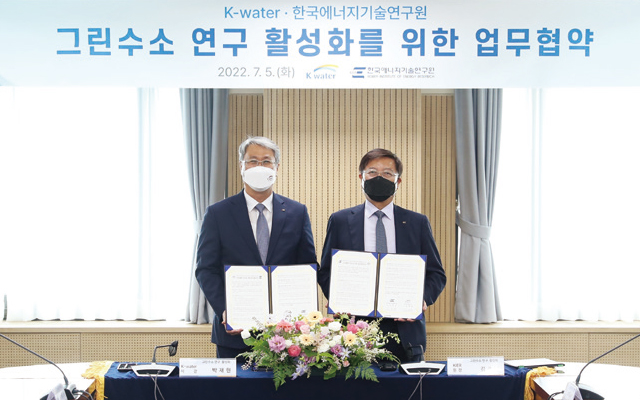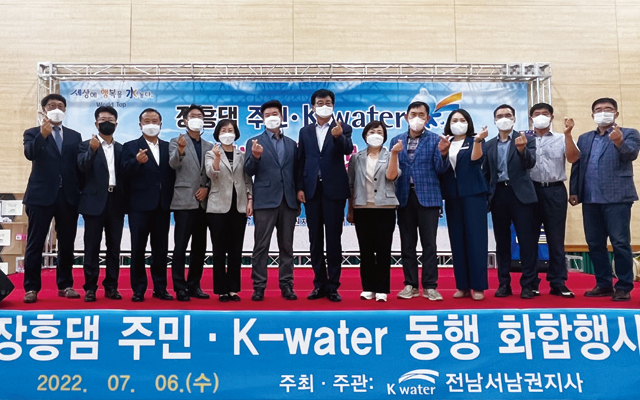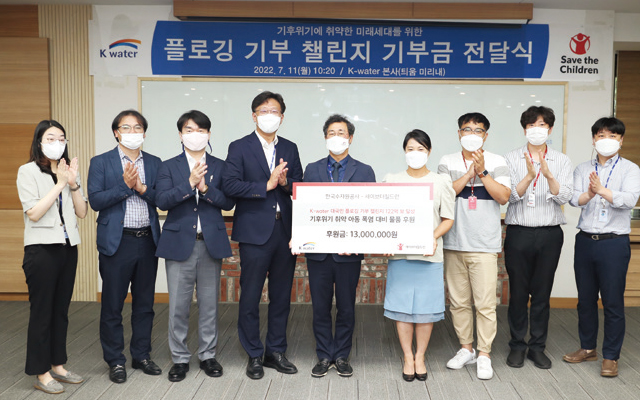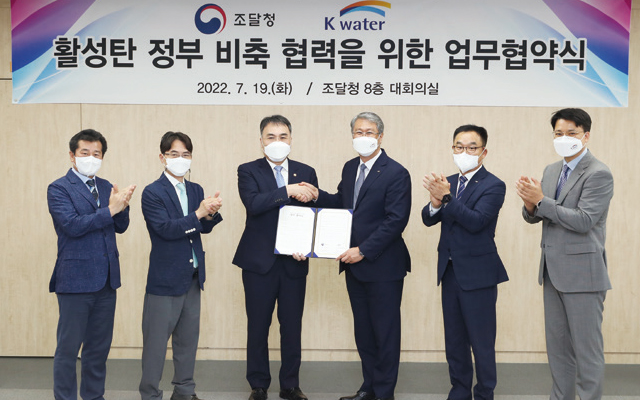-
 2022. August VOL. 653
2022. August VOL. 653
1

On July 5, 2022, K-water and the Korea Institute of Energy Research signed an agreement on green hydrogen research in a concerted bid to form a carbo-neutral society.
Based on a consensus on the growing need for Korean society to respond more actively to the climate crisis, the two organizations agreed to create a cooperation framework in which they will work together to achieve carbon neutrality by 2050, promote R&D on green hydrogen technology, and share the outcomes of R&D efforts with the society at large.
The agreement includes (1) conducting joint R&D activities to promote the widespread use of green hydrogen; (1) cooperating to research and develop green hydrogen and renewable energy; (3) sharing information and technology including market and technology trends; and the transfer of superior technology.
Under the agreement, the two organizations will expand cooperation and technology exchanges in the area of research on green hydrogen-producing technology using renewable energy for the next three years. They formed a working-level council in July, which has been meeting since then to work out ways to expand cooperation, identify specific areas for cooperation, and select research tasks, allowing the research to proceed in phases.
2

K-water has been holding various events to give back to local communities around 27 dams nationwide from July 5. Through K-water’s community support project, these events are held to reopen communication channels with local residents living near dams nationwide, which had been closed due to the pandemic and to offer healing experiences for local residents through cultural events.
The event on July 6 organized by the Jeonnam Southwestern Regional Office for residents near the Jangheung Dam was headlined by K-pop performances, a traditional dance performance and dying, nail art, and handcraft experience programs. The event had a strong turnout and was a success, with more than 200 local residents enjoying the different programs there.
These local community events are expected to help K-water facilitate communication with local residents, fulfill our social responsibility as a public corporation by offering them opportunities to enjoy cultural activities, and contribute to the development of local communities by working together with various local groups and organizations in culture and arts and other areas. These events will be held until the end of August at 27 dams and each event will features experiential programs tailored to the needs and characteristics of each region.
3

On July 11, 2022, K-water held a ceremony to present the funds raised from the plogging donation challenge to the Western regional head office of Save the Children. The donation will be used to help children from low-income families take care of their health during the summer.
Through our fundraising campaign, K-water ran the nationwide plogging donation challenge for the future generation from May 5 to June 4, 2022 in celebration of the 100th Children’s Day.
Anyone can participate in the challenge campaign by walking. If the cumulative number of steps of all participants reaches the 1 billion wark, K-water pledged to donate KRW 13 million. During the campaign, around 52,000 people joined the challenge and reached a total of 12.2 billion steps, making the event a huge success and spotlighting the cause of helping children from marginalized groups.
The KRW 13 million donated by K-water was used to provide some 100 children in Daejeon with ‘heat-wave emergency kits’, including a functional summertime bedding set, cooling products, and some hygiene items.
4

On July 19, 2022, K-water and the Public Procurement Service signed an agreement on reserves of activated carbon for advanced water treatment.
Currently, Korea imports the entire amount of the activated carbon used in the final filtering process when advanced water treatment facilities produce tap water from China. Thus, the water supply system remains vulnerable to any shortage of activated carbon supplies, putting the safe drinking water supply at risk. Amid growing uncertainties like rising global oil prices, the two organizations shared the need to increase the reserves of activated carbon as a proactive measure to ensure a stable supply of clean and safe water, and agreed to establish a system of closer cooperation.
Under the agreement, K-water will be in charge of storing and managing activated carbon and handling inventory cycle-related issues, while the Public Procurement Service will oversee the purchase of activated carbon with reserve funds, payments, and settlements for the next three years.